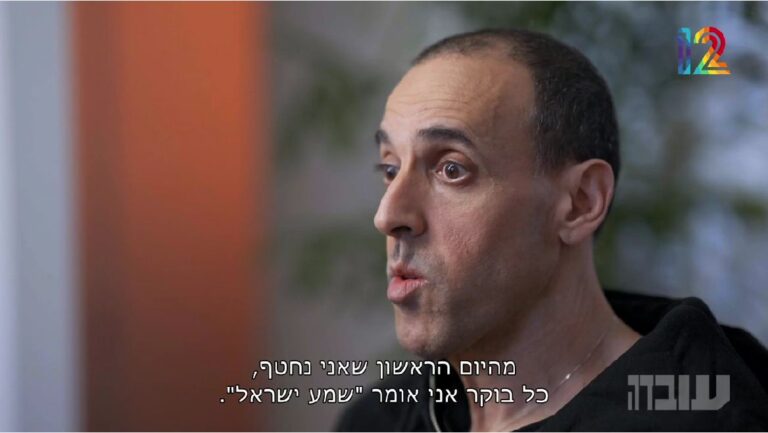 [By Rabbi Yair Hoffman]
[By Rabbi Yair Hoffman]
This past Thursday, an article by Masorati Rabbi, Reuven Hammer – a leading figure in the Conservative Jewish movement and a former president of the International Rabbinical Assembly, appeared in the Jerusalem Post.
He described how a pair of “ultra-orthodox” men had examined his Mezuzah without his permission and had left it with his neighbor telling him to relay the message, “unless we fixed it, terrible things would happen to us.”
Hammer then proceeds to question, “Does a mezuza protect a house? If so, we could cancel our contract with an alarm system and save money on our house insurance. Since when does Judaism teach such superstitious nonsense?”
He further writes, “Seeing the mezuza, one should remember what it written in it and the teachings of the Torah. Nothing is said about protection. That is what Maimonides taught in his Guide For the Perplexed. He includes the mezuza in a class of precepts that “serve to remind us continually of G-d, and of our duty to fear and love Him, to keep all His commandments, and to believe concerning G-d that which every religious person must believe” (III 44). The Talmud, for its part, says that the mezuza is one of the things that will keep a person from sinning, because it will remind them of G-d’s presence and His commandments (Men.43b). That the mezuza is some sort of magic amulet (sic) which assures protection and whose absence will bring catastrophe never appears in the Torah or these later sources.”
There are three observations I would like to make.
The first, is that if these people did, in fact, take Rabbi Hammer’s Mezuzah off without permission then this was wrong and halachically forbidden. No one has the right to take off someone else’s Mezuzah without permission. This is a violation of trespassing. The Talmud (Bava Basra 88a) records a debate between Rabbi Yehudah and the Sages as to whether taking an item without permission renders a person a gazlan, a thief, or whether he simply has the status of a borrower. Rabbi Yehudah maintains that he does not have the halachic status of a thief, while the Sages maintain that he does. The Rif and the Rambam both rule in accordance with the Sages-that he is considered a thief. Indeed, this is also the ruling of the Shulchan Aruch in four different places (C.M. 292:1, 308:7, 359:5, 363:5).
The second observation is that the term “ultra-orthodox” is a pejorative term. Religious Jews do not like it and never refer to themselves in this manner. Ultra – means extreme or too much. Rabbi Hammer would never refer to any other ethnicity or group of people with an appellation that they find demeaning – why is it permitted to do so to a group of fervently observant Jews?
The third observation is that I believe that Rabbi Hammer is incorrect and that there are sources that the Mezuzah assures protection and its absence will bring catastrophe.
The reason to observe the Mitzvah is because this is what the Creator has commanded, and it serves as a reminder to serve Hashem and to observe the Mitzvos. It does, however, have protective qualities. The Aruch haSHulchan (285:3) points out that we should not be observing the Mitzvah because of them, but because it is a commandment from Hashem.
Let’s now get to the sources:
The Talmud (Menachos 33b) states:
Rabbi Chaninah said:
Come and see how the qualities of the Holy One blessed be He are different from that of flesh and blood. It is the nature of human beings to have the master sit in the house while the servants stand guard outside. Not so is the nature of the Holy One Blessed be He! His servants sit inside while He stands guard outside.
Indeed, no less an authority than the author of the Shulchan Aruch, Rav Yoseph Karo, writes in his Kesef Mishna that the Mezuzah has protective qualities. He writes that the protection only comes with the actual observance of the Mitzvah and not through the parchment itself
The Maharam of Rottenburg, a very early authority from the era of the Rishonim is quoted both by the Tur and the Taz (See Yore Deah 286:9) as writing that “before he affixed a Mezuzah between the Bais Midrash and his home, a ruach rah would disturb him while he was taking his afternoon nap.” When a person places the Mezuzah upon his doorway, Hashem guards him from damaging spiritual forces known as mazikin as well as from other dangers. MeShiurei HaRishon LeTzion IV §169 writes that when there is a kosher Mezuzah on the doorpost the home is guarded by sixty angels and the Name of Hashem barring the entry of any damaging spiritual force. See also Rav Ovadiah Yoseph in Yabia Omer (Volume 8 YD §30) who cites a proof to this from the Jerusalem Talmud.
The Tur (285) describes the protective quality as greater than the fact that the Mezuzah extends life perhaps because the protection quality is an open miracle, while the longer life is a hidden miracle (Bais Yoseph). Alternatively, the wondrous aspect of a king watching his servants is why it is described as greater (Bais Yoseph and Bach).
According to the Sefer Chareidim (introduction), one who purposefully lives in a home (such as a tent) where he is fully exempt from observing the Mitzvah of Mezuzah will not be saved during a period of Divine Wrath (BeIdna DeRischa). This is also found in the Shla in Chulin based upon Shabbos 32b.
The reward for observing this Mitzvah is also very great. If one is careful in the performance of this Mitzvah, he and his descendants will merit long life. The converse, however, is also true (See Shulchan Aruch 285:1; Tur; Sifrei Aikev Piskah 46; See also Shabbos 32b regarding the sin of being neglectful in this Mitzvah.)
And there are other physical rewards, as well. The Talmud (Shabbos 23b) tells us that one who is careful in the Mitzvah of Mezuzah merits a beautiful home. This can be attested to by the experience of many people.
The Baal HaTurim explains that the Torah juxtaposed the Shma section in the Torah to the section of “And it shall be when Hashem shall bring you to the land..” (Dvarim 6:10) to teach us that it is in the merit of observing the Mitzvos of a Sefer Torah, Tefillin, and Mezuzah that we will inherit the land without effort.
It was also the Mezuzah and Unkulus’ meticulous observance of this Mitzvah that was paramount in the incident of the conversion of the Roman Caesar’s men recounted in the Talmud (Avodah Zarah 11b).
Unkulus the son of Klonimus converted to Judaism. The Caesar, his uncle, sent a legion of Roman soldiers to retrieve him. Unkulus enticed the soldiers to Judaism by quoting verses, and they converted to Judaism. The Caesar sent a new legion but this time he instructed them not to enter into conversation with his nephew. As they dragged him from his home, Unkulus saw the Mezuzah affixed to his doorpost. He longingly placed his hand upon it and asked them, “Do you know what this is?” The soldiers could not contain their curiosity and answered, “You tell us.”
Apparently moved by what they observed, they asked him about it, thus ignoring their Caesar’s instructions. Unkulus explained the unique nature of this Mitzvah that we have seen before:
It is the nature of human beings to have the master sit in the house while the servants stand guard outside. Not so is the nature of the Holy One Blessed be He! His servants sit inside while He stands guard outside. As it states (Tehillim 21:8), “Hashem Shall guard your departure and arrival, from now and forever more.”
They too converted, and the Caesar did not pursue the matter further.
We see from sources throughout the Babylonian Talmud, the Jerusalem Talmud, the Rishonim, and the Shulchan Aruch that the Mezuzah indeed offers protection from damaging spiritual forces, from sin, and from other dangers. It offers long life for us and for our children, the reward of beautiful home, and the land of Israel itself.
Rabbi Reuven Hammer wrote a masterful translation of the Sifrei but in these latter two points, I believe he is in error. The Talmudic sources clearly demonstrate that there is most certainly a protective quality to Mezuzah. It is not the reason we should perform it, but it there plain as day. Rabbi Hammer should issue a clarification.
The author can be reached at [email protected]. Rabbi Yair Hoffman is the author of eleven books on Jewish law including, Mezuzah A Comprehensive Guide as well as the Not Your Usual Halachah series. His books are available on Amazon.com and have approbations from leading Torah scholars of the generation.











6 Responses
The moral of the story is that its more important to argue with a conservative rabbi than to teach basic manners, apparently.
Would the author please comment on the Gilyon MaHarSha “Kihei Shetishmor” which is quoted in Yoreh Deah.
Hammer should be sued for malpractice!
Also see Rashi Pesachim 4a חובת הדר
what he writes about “ultra-orthodox”
Funny that when a chabad rabbi wrote the same, and it was published on YWN everyone went nuts……
Don’t call conservative clergy “rabbi’s” it’s an insult to the title. Just because they use, doesn’t mean we should refer to them as such/